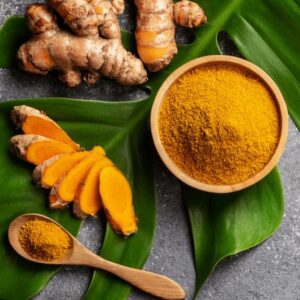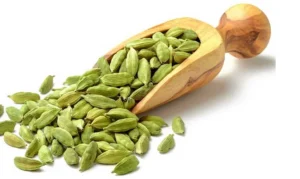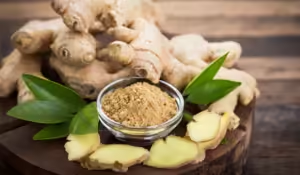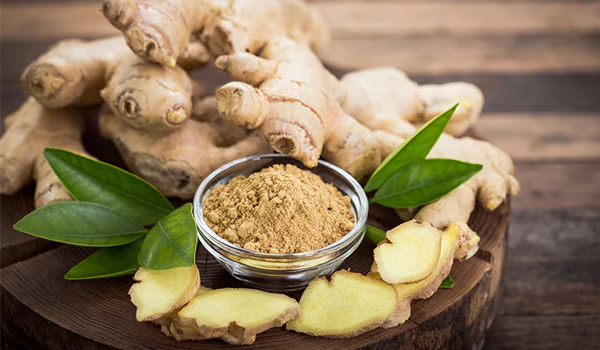The Spice of Life: Health Benefits of The Ginger Family
Discover the ancient wisdom of turmeric, ginger, and cardamom, three spices that have been revered for centuries for their health-promoting properties. Beyond their culinary uses, these natural ingredients offer a wealth of benefits for your body and mind. From boosting immunity to aiding digestion and reducing inflammation, learn to incorporate these powerful spices into your daily routine for a healthier, happier you. These spices all belong to the Zingiberaceae.
Turmeric
Turmeric is a relative of ginger. It is a common spice that comes from the root of Curcuma longa. It contains a chemical called ‘curcumin. Turmeric has a grounding, somewhat soil-like taste. It is kind of spicy, similar to black pepper. It can be slightly bitter, especially when used in larger quantities when cooking. Turmeric helps fight infections and some cancers, reduce inflammation, and treat digestive problems.
Studies have found it to be as effective as prescription anti-inflammatory medication. This makes it particularly useful in conditions like inflammatory bowel disease, pancreatitis, and arthritis.
however, the curcumin content in turmeric is only about three percent. Eating raw turmeric root won’t be effective, according to experts. Instead, you need to take curcumin extract. Curcumin isn’t bioavailable (although it’s much more so as a liquid extract), it needs to be combined with something that allows the system to absorb it. Black pepper or Bioperin® (a black pepper extract) seems to do the trick. If you take a curcumin supplement, make sure it has black pepper added or swallow a peppercorn along with the pill.

On the other hand, turmeric has additional components, and some studies feel that its advantages go beyond curcumin. They don’t know for sure, though, because studies to date have mostly focused on curcumin.
“In any event, curcumin shows that your body can absorb it.” and offers plenty of other benefits. The most notable is its use as an anticarcinogen.
As we’ve written before, “Studies have shown that [curcumin] can inhibit colon cancer cells by 96% in a matter of hours. It also appears to have great potential in countering the effects of prostate cancer and breast cancer.” A 2015 study published in Nutrition Review found that curcumin weakens or disables certain types of cell signalling pathways, inhibiting tumour growth. Further study found that curcumin combined with alpha-tomatine, which is found in tomatoes, can stop the growth of prostate cancer cells and perhaps even kill existing cells. 6 Earlier studies also confirmed curcumin/turmeric’s usefulness in combating prostate cancer.
CARDAMOM
Cardamoms are the dried fruits of perennial herbs. They are one of the highest-priced and most expensive spices. The seeds have a pleasant aroma and a characteristic warm, slightly pungent taste. Its relation to turmeric and ginger shows that it offers similar digestive benefits, fighting nausea, vomiting, indigestion, diarrhoea, loss of appetite, heartburn, and irritable bowel syndrome. And, like its cousins, it has anticarcinogenic and anti-depressive properties.

It’s a natural anti-spasmodic, anti-inflammatory, and detoxifying agent and may help reduce blood pressure and prevent depression. It’s also useful in treating asthma. One of its most important uses is as a liver cleanser. Cardamom improves the flow of bile from the liver and gallbladder. Finally, cardamom freshens the breath and prevents dental decay.
GINGER
People typically use fresh or dried ginger in cooking or herbal tea, and others take ginger supplements for possible health benefits. Ginger is similar to turmeric and also has anti-inflammatory properties. Studies show that ginger extract taken internally can help ease arthritis symptoms. 8 But the big thing that ginger is known for is its use as a digestive tract balm. Remember being given ginger ale to cure your belly ache? While soda has too much sugar and too little ginger to do you any good, teas of boiled ginger or ginger supplements can be very effective in fighting nausea and indigestion.

Studies also show that ginger can lower blood sugar, reduce menstrual pain, lower cholesterol, and protect against infection. There’s some indication that ginger, like turmeric, can inhibit cancer and improve brain function, although the evidence for turmeric is stronger.
Ginger, turmeric, and cardamom have been used for years to reduce inflammation, enhance digestion and circulation, and strengthen the immune system. They are also a good source of antioxidants that protect our cells against damage.
In conclusion, the health benefits of these spices are quite enthralling, as they can be used fresh or as spices for soup. People should not neglect these spices because they feel it’s not important.’ Health is wealth. They should not keep this information to themselves but share it with neighbours about the health benefits; who knows, you might save lives.
READ: “Undernutrition increasing diabetes and hypertension in Nigeria”- health minister.
Content Credit| Igbakuma Rita Doom
Picture Credit | https://www.pinterest.com/pin/628885535499456281/
https://kinalglobalcare.com/green-cardamom.html
https://www.bebeautiful.in/all-things-skin/skin-concerns/5-benefits-of-ginger-for-hair-and-skin




